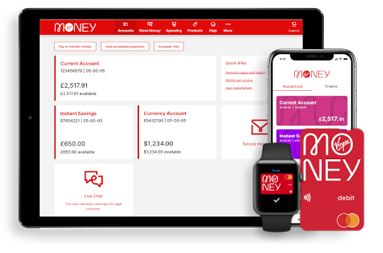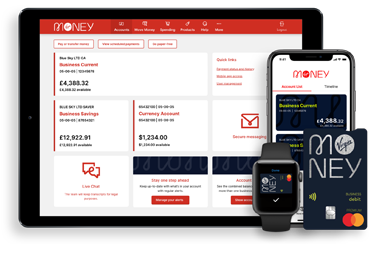-
Login
More Login links
Internet Banking
Business Internet Banking
Started an application?
Other services
Help
-
Register
More Register links
Internet Banking
Business Internet Banking
Other Services
- Our Products More business product links
Bank accounts
- Business current account
- Business choice account
- Switching business accounts
- Compare all business accounts
Savings accounts
Loans and Finance
- All Treasury solutions
Treasury solutions
Help and support
- Online Banking More online banking links
BusinessOnline
- Commercial More commercial business links
Business enquiries
Contact us about a general enquiry.
- Corporate and Structured Finance More corporate business links
Corporate and Structured Finance
SME Cashflow Finance
Unlock your cash flow potential. At Yorkshire Bank we take a flexible approach to business borrowing.
Lending is subject to status and eligibility.
- Our Sector Expertise More sector expertise links
A guide to recruiting right
< back to all business news articles
25/03/2019
Staff are an essential component for any business and getting the right people on board and then managing them effectively is critical to business success.
It’s also exciting, because whether you’re hiring your first employee or your 50th, it means that your business is at a turning point in its growth.


First, is now the right time to hire?
This is an important question to ask yourself. Too early and you might expose your business to unnecessary costs. Leave it too long, and you might reach capacity, and risk not being able to deliver to customers.
- Am I missing out on new opportunities? A new employee can either increase your current capacity, or they may have new skills to allow you to do/deliver different things.
- Are you working long hours and stressed with the burden of being the boss? Take a look at your work/life balance, and think how you’re feeling on a day-to-day basis. Has the pressure crept up on you? Are you spending most of your days feeling harassed and stretched?
- Do you still spend most of your time on your strengths? If you no longer have the time to concentrate on what you’re really good at – the core of your business – then it’s a good sign you need help delegating those tasks that are not.
What kind of employee do I need?
Once you’ve made the decision to hire an employee, the next step is to determine the type of employment that best suits your business. The most common options are:
- Full-time employee – they are more likely to be committed as they have a vested interest in the future of the business (as you are their sole income).
- Part-time employee a few hours or days per week – a good option if you’re not sure you can justify a full-time position (and a good way to test the water).
- Fixed term employee for a few months – these work well for fixed projects where know what your costs will be and when they’ll stop.
- Contractors and subcontractors – where you use another company or sole trader to do the specific work, usually for project work. Make sure they are a contractor and not an employee; check out GOV.uk’s guide to be clear.
Finding the right people
It’s often the hardest aspect of employing someone, to find the perfect employee that can do the job and blend into your current business culture. Sources of new staff include:
- Asking staff, friends and family. Your present staff, for example, might know of someone suitable.
- Using your business and industry networks.
- Advertising in local or community newspapers or trade journals.
- Listing the position on an Internet job search site such as Reed.
- GOV.uk. This has a section for advertising jobs as well as looking for them.
Using agencies
Using employment agencies or human resources (HR) consultants to source new staff is an alternative option that has some benefits.
A good agency or HR consultant will give you advice on the job specification you’ve drawn up, and will be able to reduce all the applications to a shortlist for you to consider, usually with notes on their suitability. They might also have people already on their books who meet your requirements and are able to start immediately.
Writing the job description
Your aim to define as clearly as possible what you want the new position to achieve. If your employees are clear about their tasks and what's expected of them, you're more likely to get the right candidates applying.
The job description should include:
- The job title and position in the business
- A description of the key tasks and responsibilities
- Any skills, qualifications and experience (or training you will provide) required to handle these duties
- Any expected targets or outcomes.
- The kind of qualities you’re looking for in the employee.
- Employment conditions - full-time or part-time, permanent or fixed term?
- The wage or salary range, plus overtime rates if applicable and any fringe benefits such as a company car.
- The hours of work
- The benefits of working for your business.
- The trial period for the position.
At the actual interview, you’ll also need to outline other issues such as annual leave, sick leave, superannuation scheme (if there is one) and retirement policy.
The interview stage
Narrow down the applicants to a shortlist that meet most or all of what you're looking for. The key to successful recruitment is to set clear objectives and be consistent in your approach. Write down the important questions you want to ask, and work through these with each candidate. Make brief notes of their replies, because if you’re interviewing a number of applicants it's not always easy to remember what they all said.
Background checks
You should reference check applicants you consider suitable (don’t waste time checking all the applicants’ details prior to this). Remember that CVs are written to present people at their very best, so treat them with caution. In general, the written references that accompany CVs are less valuable than verbal references. People are unlikely to put anything really candid about the applicant in a form that the applicants can read.
Previous employers or managers, for example, are likely to be more forthcoming if you phone them. Make sure you stress the conversation will remain confidential and will not be passed on to the applicant.
Summary
Finally, make the most of the investment you’ve already made in the person you’ve hired. In particular, make sure that they can be productive as soon as possible - don’t just leave them to ‘find their own way’ in the business. Instead, have a proper induction process in place that welcomes the new arrival, trains them in required procedures, and gives them the resources necessary to get on with the job.
Next steps
- Google what online recruitment platforms you can make use of.
- Research employment agencies and decide if you’ll let them handle the initial grunt work.
- Talk to one of our small business specialists about how we can help.
The recruitment challenges facing SMEs
Recent research from Yorkshire Bank, in partnership with Telegraph Spark and YouGov, which surveyed 1,000 business owners, found that SMEs share a common challenge in sourcing talent, with major regional disparities in terms of the ease with which they find staff. Click here to find out on The Telegraph.
POSTED IN: Growth
SHARE
Related Articles
You are here: Business Banking > Business News > Articles
- About Yorkshire Bank
- About us
- Virgin Money UK PLC
- Media relations
- Careers

Internet Banking has moved
To log into Internet Banking you now need to use Virgin Money Internet Banking. You'll get the same great service and are able to access all your accounts.
Your log in details will stay the same and you can log in directly from the shiny new Virgin Money website.
Continue to Virgin Money Internet Banking
Go to the Virgin Money website
Be Alert
Never tell anyone a token 3 response code, even someone from the bank. You should only input these codes to our secure Business Internet Banking service when you’re sending and making payments. If anyone calls and asks for a token 3 response code or asks you to authorise a payment on the App for fraud checks, hang up and call us on 0800 085 2914 from another line if possible, remember the Bank will never ask you to disclose your security details.
Continue to Virgin Money Business Internet BankingYou can find impartial information and guidance on money matters on the “MoneyHelper” website.
Yorkshire Bank is covered by the Financial Services Compensation Scheme (FSCS), Find out more.
